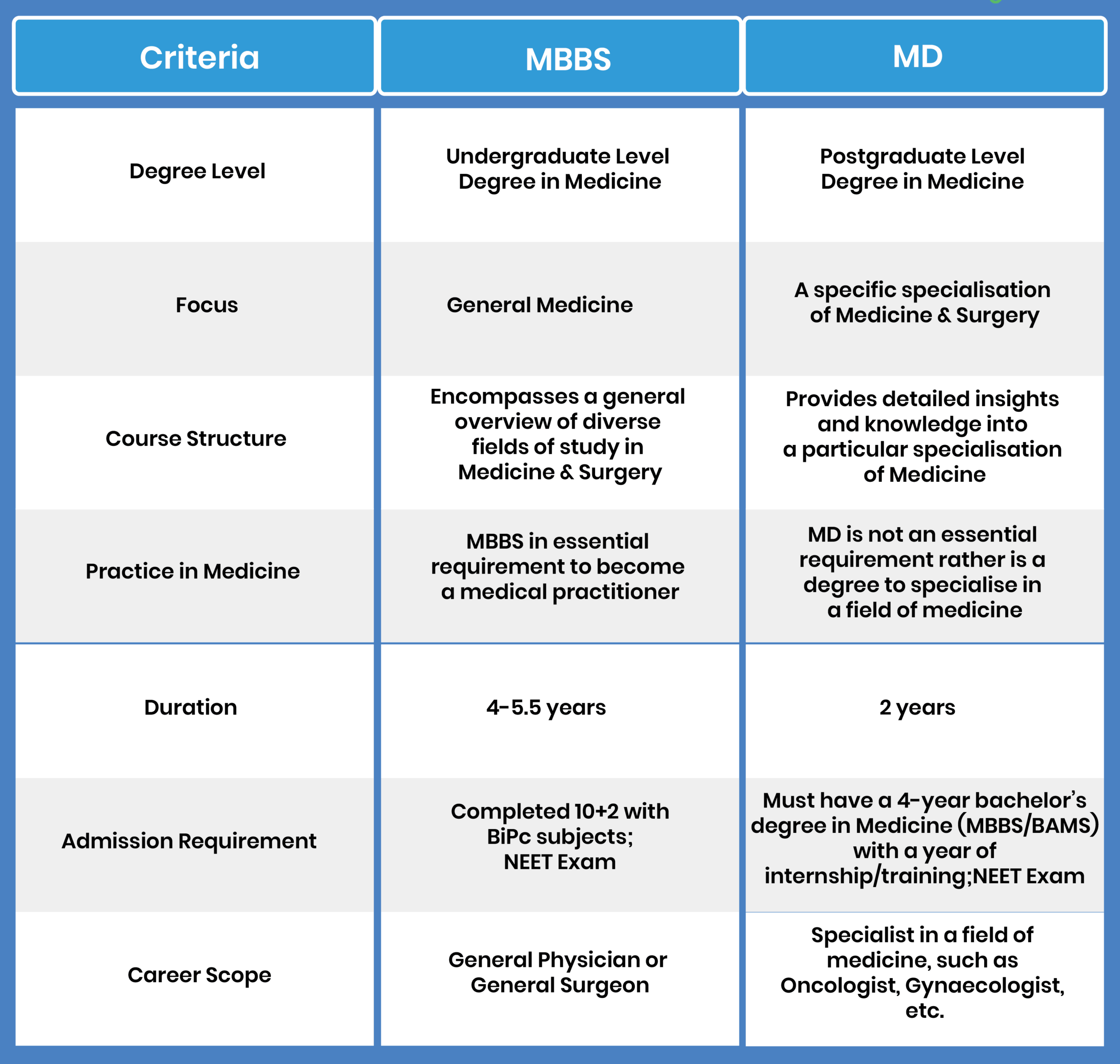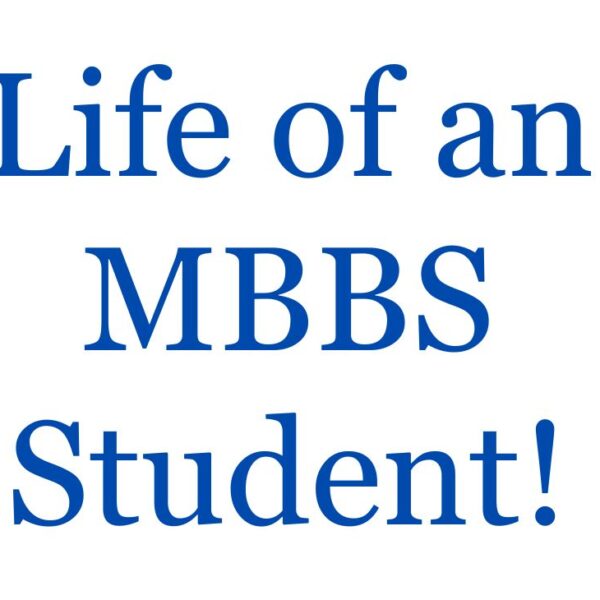
MBBS Vs BDS
After completing Class 12/Intermediate with Physics, Chemistry, and Biology (PCB) as their main subjects can choose either MBBS, BDS, or B.Sc Nursing, or MBChB, or any other graduate degree as per their choice of interest. The aspirants who are confused about choosing between MBBS and BDS can check the complete details about both the courses and opt for any of the courses based on their interests.
MBBS aspirants can work as a doctor and BDS aspirants can work as a Dentist. Every profession has its values and considerations. Let us now have a deeper understanding of MBBS Vs BDS to have more clarity.
MBBS Full Form and BDS Full Form
MBBS stands for “Bachelor of Surgery, Bachelor of Medicine.” It’s a way of saying “Doctor” in Latin. In India, MBBS is the main course to become a medical doctor.
BDS means “Bachelor of Dental Surgery.” After finishing high school, you can study BDS to become a dentist.
In India, many students who study Science in Class 12 (with subjects like Physics, Chemistry, and Biology) want to do the MBBS course. MBBS degree is the most popular choice of many. To be a proper modern medicine doctor in India, one must pursue an MBBS degree. Select colleges approved by the Medical Council of India to pursue the MBBS degree.
After finishing MBBS, many people also like another course called BDS. It’s for people who wish to practice as dentists. The Dental Council of India drives the BDS program. Complete syllabus and details monitored by the DCI.
MBBS & BDS – Course duration
The MBBS course takes 5.5 years to finish. The first 4.5 years are about learning in classrooms, and the remaining 1 year is for internship.
In the internship part of MBBS, students get to work in different parts of the hospital. This helps them put their bookish knowledge into real-time experience.
BDS is another degree that takes 5 years to complete. Four years are about studying theories, and the last year is for an internship where students work in different areas to get practical experience.
MBBS Vs BDS – Admission process
To get admission in MBBS or BDS Courses students must have completed their class 12/Intermediate with PCB as main subjects with at least 50% marks (General category) and 40% marks (reserved category).
The National Qualification Compliance Entry Examination (NEET) is organized by the National Tests Agency (NTA). Every year to provide admissions into MBBS and BDS courses. Candidates qualifying for the NEET exam with the required cutoff marks (category-wise) will get admission to the MBBS/BDS courses.
After the declaration of the NEET exam results, the counseling process will be done separately for MBBS and BDS courses. Candidates are urged to register for the counseling method one at a time. Based on the merit list, the counseling process will be conducted by the NTA. Admission is going to be granted based on the NEET rank and category of a candidate.
MBBS Admission Process
To get into medical colleges for the MBBS program, students are chosen based on how well they do in entrance exams. The process starts with students taking national-level tests like NEET, AIIMS, or JIPMER. If they do well, they can then attend counseling and pick a college for their MBBS studies.
Fees for MBBS
The cost of MBBS studies differs based on whether it’s a government, private, or deemed university. The total cost for public universities in the nation might range from INR 11,000 to 7.5 Lakhs. The cost of a private institution might range from INR 20 lakhs to INR 80 lakhs. Private college fees can go from INR 20 lakhs to INR 80 lakhs.
MBBS Course
This MBBS program offers a broad education the fact that protects every facet of contemporary clinical treatment. The three most crucial components of the exam are divided into: Paraclinical and pre-medical Here’s an overview of the MBBS course syllabus:
Pre-Clinical Phase
- Anatomy
- Biology
- Physiology
Para – Clinical Phase
- Microbiology
- Medical Forensics and Toxicological
- Pathologist
- Clinical Phase
- Pharmacology
- Anesthesiology
- Health in communities
- Pediatrics
- Medicine
- Obstetrics and Gynecology
- Dermatology and Venereology
- Ophthalmology
- Psychiatry
- Orthopedics
- Operative Technique
Specializations after MBBS
Candidates can choose to pursue any interested specialty after graduating from the medical degree program. It takes 3-years to pursue an MD/MS course and 2 years to study a PG Diploma course.
- Internal Medicine
- Dermatology & Venereology,
- Orthopedics
- Anatomy
- Psychiatry
- Anesthesiology
- Biochemistry,
- Pediatrics
- Surgery
- Pathology
- Microbiology
- Physiology etc.
MBBS Career Scope
Upon completing the MBBS course, students have various job avenues to explore. They can work in private or government hospitals. Graduates also have the option to pursue postgraduate studies, which allows them to specialize in a specific area of medicine. They can opt for MS or MD after MBBS.
Advantages of Choosing MBBS
The MBBS program holds great value in India, offering several benefits and unique advantages:
- Abundant Opportunities: The medical field provides ample room for growth and promising career paths.
- Noble and Rewarding: Being a doctor is a noble profession that involves saving lives and enhancing patients’ quality of life.
- Lucrative Prospects: Medical professionals, especially those with extensive experience and specialization, can earn a substantial salary.
Bachelor of Dental Surgery BDS
The most popular dental school degree is the Bachelor of Dental Surgery (BDS) popular medical course throughout India. It takes five years to complete an undergraduate application, including four years of academic study and one year of required internship.
People who choose BDS become dentists, focusing on maintaining their patients’ oral health. With increasing awareness about dental well-being, BDS has emerged as a growing career choice for Indian students.
BDS offers various specializations, including oral pathology (diagnosing mouth diseases), periodontics (caring for gums and related conditions), orthodontics (aligning teeth and jaws), and Oral and Maxillofacial Surgery (handling tooth extractions, surgeries, and addressing teeth or gum injuries).
Roles and responsibilities based on BDS specializations:
- Oral Pathology: Diagnosing diseases that affect the mouth.
- Periodontics: Caring for gum health and treating related ailments.
- Orthodontics: Aligning teeth and jaws properly.
- Oral and Maxillofacial Surgeon: Conducting tooth extractions, surgeries, and managing teeth or gum injuries.
BDS Eligibility Criteria
For those interested in the BDS program, meeting these eligibility criteria is necessary:
- Successful completion of Intermediate/Plus 2 from an accredited board.
- At some point in grade 12, Physics, Chemistry, and Biology will be required studies.
- Ideally, you should have received a PCM (Physics, Chemistry, and Biology) grade of at least 50% in class 12.
- The candidate must be at least 17 years old.
BDS Admission Procedure
Students aiming to enroll in BDS must take a national-level medical entrance exam, NEET-UG. Other options are AIIMS and JIPMER. Clearing the exam and participating in counseling are essential steps to secure admission to a medical college.
BDS Fees
The cost of BDS education varies based on whether it’s a government college, private institution, or deemed university. On average, BDS fees For the full voyage, prices in India range from INR 50,000 to INR 12 lakh.
BDS Curriculum
The BDS program covers a comprehensive range of Dental sciences and surgery topics. The duration of the course is four years, the curriculum equips dental needs with the knowledge and skills they need. Refer below for a glimpse of the BDS syllabus:
BDS First Year Syllabus
- Human Physiology and Biochemistry, Nutrition and Dietetics
- Human Anatomy including Embryology and Histology
- Dental Materials
- Dental Anatomy Embryology and Oral Histology
- Pre-clinical Prosthodontics and Crown & Bridge
BDS Second-Year Syllabus
- Modern microbiology and pathology
- Preclinical Conservative Dentistry
- Dental Supplies
- Oral Microbiology & Pathological
- Dentist Therapeutics and Pharmacology
- Prosthetic dentistry and crowns and bridging pre-clinical studies practice.
BDS Third-Year Syllabus
- General Surgery
- Oral Pathology and Oral Microbiology
- Orthodontics & Dentofacial Orthopedics
- Oral & Maxillofacial Surgery
- General Medicine
- Oral Medicine and Radiology
- Periodontology
- Conservative dentistry and Endodontic
- Pediatric & Preventive Dentistry
- Prosthodontics and Crown & Bridge
BDS Fourth Year Syllabus
- Orthodontics & Dentofacial Orthopedics
- Pediatric & Preventive Dentistry
- Prosthodontics and Crown & Bridge
- Oral Medicine & Radiology
- Periodontology
- Oral & Maxillofacial Surgery
- Conservative Dentistry and Endodontics
- Public Health Dentistry
Specializations after BDS
Once you’ve completed your BDS degree, there’s a world of possibilities to further your dental education. Your choice can be made to your interests, skills, and the direction you want your dental career to take. Going for a postgraduate degree in dental science opens doors to various exciting fields.
MDS: Mastering Dental Expertise
An MDS degree, or Master of Dental Science, is a 3-year program designed to delve into advanced dental sciences and advanced oral surgical techniques. This specialized training equips you to become an expert, practitioner, or consultant in your chosen area of Dental Science. MDS offers an array of specializations such as:
- Orthodontics
- Prosthodontics
- Oral and Maxillofacial surgery
- Periodontics
- Conservative Dentistry
- Operative Dentistry
- Oral Medicine and Radiology, etc.
Career Options After BDS
Completing the 5-year BDS program opens up a world of possibilities for students. Many reputable medical colleges offer employment chances in both private and public hospitals upon graduation.
Enhanced job prospects await those who pursue an MDS, a postgraduate course available after BDS. Further education can be pursued in India or abroad, and with time and experience, graduates can establish their dental clinics.
Advantages of Opting for BDS
BDS education is the gateway to the world of dentistry, offering many opportunities in both the public and private sectors. Here are some interesting reasons to consider pursuing BDS:
- Versatile Career Paths: Graduates have a multitude of career options and trajectories.
- Oral Health Guardianship: Like doctors, dentists play a major role in ensuring their patients’ oral health, significantly enhancing their quality of life.
- Intellectual Stimulation: Dentists can embark on an intellectually enriching journey, continually updating their skills and staying informed about the latest advancements in the field.
In essence, BDS not only shares dental skills but also opens doors to a fulfilling and impactful professional journey.
MBBS Vs BDS Comparison
| Aspect | MBBS (Bachelor of Medicine, Bachelor of Surgery) | BDS (Bachelor of Dental Surgery) |
| Duration | 5.5 years (including 1 year of internship) | 5 years (including 1 year of internship) |
| Eligibility | Class 12th Science (PCB) with NEET-UG | Class 12th Science (PCB) with NEET-UG |
| Specialization | Various fields of medicine | Dental science and surgery |
| Career Options | Medical doctor in various specialties | Dentist, oral health practitioner |
| Postgraduate Studies | Can pursue MD or MS for specialization | Can pursue MDS for advanced specialization |
| Responsibilities | Diagnosing, treating medical conditions | Taking care of oral health and hygiene |
| Placement Opportunities | In government and private hospitals | In private and government dental clinics |
| Career Growth | Potential to become specialized doctors | Potential to become specialized dentists |
| Job Market | High demand for qualified medical doctors | Growing awareness for dental health |
| Salary Range | Varies based on specialization and location | Varies based on specialization and location |






